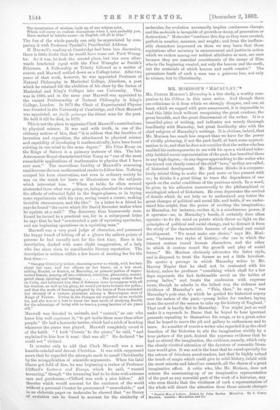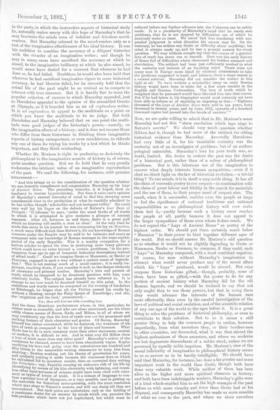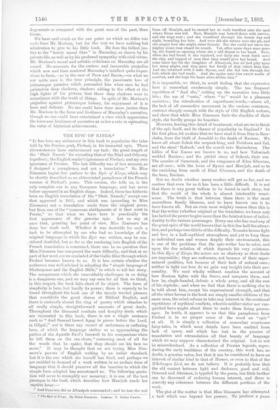MR. MORISON'S " MACAULA.Y."*
Ma. COTTER MORISON'S Macaulay is a fine study, a worthy com- panion to his Gibbon in this same series. And though there are criticisms in it from which we strongly disagree, and one, at least, which we regard with pure amazement, it is impossible to read this little book without recognising the great candour, the great breadth, and the great discernment of the writer. It is a beautiful piece of writing, and indicates not merely thorough familiarity with Macaulay, but great familiarity also with the chief subjects of Macaulay's writings. It is obvious, indeed, that Mr. Morison has much less respect than we have for the power of vividly picturing, if not the past itself, at least some approxi- mation to it; and that he does not consider that the writer who has enabled his contemporaries to see with his eyes a vivid and toler- ably faithful scenic representation of the past, has benefited them in any high degree,—in any degree approaching to the writer who has traced out clearly some of the chief "laws," as they are called, of historical development. Mr. Morison thinks it a compara- tively trivial thing to make the past more or less present with us ; he thinks it a great thing to trace the dependence of one epoch on the social conditions of the previous epoch. In a word, he gives in his adhesion unreservedly to the philosophical or sociological school of historians. He even deprecates the revive/ of details which de not help us to understand any better the great changes of political and social life, and holds, if we under- stand him aright, that the power of exciting the imagination,. as Macaulay, for instance, excites it, is a mischievous power, if it operates—as, in Macaulay's hands, it certainly does often operate—to fix the mind on points which throw no light on the principles of political and social change, and to distract it from the study of the characteristic features of national and social' development. " We must make our choice," says Mr. Mori- son, " between two styles of history,—the one in which the. interest centres round human characters, and the other in which it centres round the growth and play of social forces." Mr. Morison obviously advocates the latter style, and is disposed to treat the former as not a little frivolous. He quotes a passage in which Macaulay writes to Mr. Macvey Napier that he shall not be contented with hia history, unless he produces "something which shall for a few days supersede the last fashionable novel on the tables of young ladies," and treats the confession with supreme scorn, thotigh he admits in the fullest way the richness and vividness of Macaulay's art. " This, then," he says, " was Macaulay's pole star, by which he guided his historical argosy over the waters of the past,—young ladies for readers, laying down the novel of the season to take up his history of England. That scoff is hardly fair to Macaulay. You might just as well make it a reproach to Burns that he hoped to hear ignorant peasants repeating to themselves his songs, or to a great actor that he hoped to move the pit and gallery to enthusiasm and to tears. As a matter of course a writer who regarded it as the chief function of the historian to stir the imagination vividly by a true picture of the past, desired the supreme evidence that he had so stirred the imagination, the evidence, namely, which only the closely-rivetted attention of the devotees of romantic litera- ture would give. It was not in the least that he cared specially for the esteem of frivolous novel-readers, but that be highly valued. the touch of magic which could give to solid history, inlaid with the most minute and labornus research, all the charm of a great imaginative effort. A critic who, like Mr. Morison, does not esteem the summoning-up of an imaginative representation of the past as any essential part of the work of a historian, nay who even thinks that the vividness of such a representation of the whole will divert the attention from those minute changes • English Mon of Letters. Edited by John Morley. Mantnin. By J. puttee Morison. London : Macmillan and Oo. in the parts, in which the instructive aspects of historical study lie, naturally makes merry with this hope of Macaulay's that he may fascinate the minds even of indolent and frivolous novel- readers. But Macaulay referred to the novel-readers only as a test of the imaginative effectiveness of his ideal history. It was his ambition to combine the accuracy of a diligent historian with the vivacity of an imaginative writer ; and though he may in many cases have sacrificed the accuracy at which he aimed, to the imaginative brilliancy at which he also aimed, he would never have denied for a moment that wherever he had done so, he had failed. Doubtless, he would. also have held that wherever he had sacrificed. imaginative vigour to mere historical accuracy, he had likewise failed, for he sincerely held that the actual life of the past might be so revived as to compete in interest with true romance. But it is hardly fair to treat the popular criterion of success to which Macaulay appealed, just an Herodotus appealed. to the opinion of the assembled Greeks at Olympia, as if it branded him as an ad captandum writer. It is ad captandula to appeal to the multitude on a point on which you know the multitude to be no judge. But both Herodotus and Macaulay believed that on one point the multi. tude were good judges of the historian's power,—namely, on the imaginativa effects of a history ; and it does not become those who differ from these historians in thinking these imaginative aspects of history unimportant, or even mischievous, to ridicule any one of them for trying his works by a test which he thinks important, and they think misleading.
Whether Mr. Morison is right in preferring so decisively the philosophical to the imaginative aspects of history is, of course, quite another question. But we do hold that ho very greatly underrates the intrinsic value of an imaginative reproduction of the past. We read the following, for instance, with genuine amazement :—
" And this brings LIB to the consideration of the question whether we can honestly compliment and congratulate Macaulay on his Lays of _Ancient Roses. The preceding remarks, it is hoped, show no tendency to morose hypercriticism. But does it raise one's opinion of Macaulay's earnest sincerity of mind to find him devoting some considerable time to the production of what he candidly admitted to be but trifles, though ` seholarlike and not inelegant trifles.' He could very well lay his finger on the defects of Bulwer's Last Days of Pompeii : 'It labours,' he says, under the usual faults of all works in which it is attempted to give moderns a glimpse of ancient manners. After all, between us and them, there is a great gulf which no learning will enable a man to clear.' At the very time he made this entry in his journal he was composing his lay on Horatius, a much more difficult task than Bulwer's, for our knowledge of Roman manners under the Empire may be said to be intimate and exact as `compared with our knowledge of Roman manners in the temi-mythic period of the early Republic. Was it a worthy occupation for a serious scholar to spend his time in producing mere fancy pictures which could have no value beyond a certain prettiness, in the pro- longation from age to age of romantic historical descriptions instead of sifted truth P' Could we imagine Grote or Mommsen, or Ranke or Freeman, engaged in such a way without a certain sense of degrada- tion ? This is not making much of a small matter; it is really im- portant, reaching down, if you consider it well, to the deeper elements of character and primary motive. Macaulay's love and pursuit of truth, which he imagined to be dominant passions with him, were relatively feeble. The subject has already been referred to. It is strange to see how much he deceived himself on this point. In the ambitious and wordy verses he composed on the evening of his defeat at Edinburgh, he feigns that all the Fairies passed his cradle by, without a blessing, except the Fairy Queen of Knowledge ; and she, the ` mightiest and the best,' pronounced,—
Yes ; thou wilt love me with exceeding love.
And the three illustrious predecessors whom, in this particular, he wishes most to resemble, and who are alone mentioned, are the three oddly chosen names of Bacon, Hyde, and Milton, in all of whom we may confidently say that the love of truth was not the prominent and striking feature of their character and genius. 0£ Bacon, Macaulay himself has rather overstated, while he deplored, the weakness of his love of truth as compared to his love of place and honours. What Hyde has to do in such company more than other statesmen, ancient or modern, it is difficult to see. And in what way did Milton show a love of truth more than any other poet ? Macaulay's notion of the sentiment he claimed, seems to have been abundantly vague. Kepler fifty times, his laws and going over the calculations one hundred and frles, in the meanwhile writing almamacks to keep him from starving ; Newton working out his theory of gravitation for years, and modestly putting it aside because the erroneous data on which be calculated led to incorrect results, then on corrected data writing tcitiheenPrtincipia ; nay, Franklin running an unknown risk of his life by identifying by means of his kite electricity with lightning, and count- less other loyal servants of science might have been cited with relev- ancy as types of lovers of truth. It is a misuse of language to con. the fuse a general love of literature, or a very sensible zeal in getting up In hi materials for historical scene-painting, with the stern resolution which lays siege to Nature's secrets, and will not desist till they are surrendered. But such pains are undertaken only at the bidding of a passionate desire for an answer by minds which can perceive the test-problems which have not yet capitulated, but which must be
reduced before any further advance into the Unknown can be safely made. It is a peculiarity of Macaulay's mind that he rarely sees problems, that he is not stopped by difficulties out of which he anxiously seeks an issue. We never find him wondering with sus- pended judgment in what direction his course may lie. On the contrary, be has seldom any doubt or difficulty about anything; his mind is always made up, and he has a prompt answer for every question. We may without scruple say that the course of a genuine love of truth has never run so smooth. Here was the early history of Rome full of difficulties which clamoured for further research and elucidation. The subject had been just sufficiently worked to whet the curiosity and interest of an inquiring mind. There were not many men in Europe more fitted by classical attainments to take the problems suggested in hand, and advance them a stage nearer to a correct solution. Macaulay did not consider the matter in this light at all. To have written a soholarlike essay on early Roman history would have been to write for a few score readers in the English and German Universities. The love of truth which he imagined that he possessed would have directed him into that course. But if he had taken it, his biographer would most certainly not have
been able to inform us of anything so imposing as this Eighteen thousand of the Lays of Ancient Rome were sold in ten years, forty thousand in twenty years, and by Rine, 1175, upwards of a hundred thousand copies had passed into the hands of readers.' " Now, we are quite willing to admit that in Mr. Morison's sense Macaulay had not this " stern resolution which lays siege to Nature's secrets." We should very much question whether Gibbon had it, though he had more of the instinct for sifting historical evidence than Macaulay. Assuredly Herodotus had very little of it, for his insatiable curiosity was the curiosity not of an investigator of problems, but of an anthro- pological naturalist. Macaulay's love for pure truth was, no doubt, limited. His desire to restore the past was the desire of a historical poet, rather than 'of a solver of philosophical problems. But is this laborious use of the imagination to recover what deeply interests human sympathies,—even if it shed no direct light on the law of historical evolution,—a trivial thing ? To our minds, it is in itself a very noble thing. It has all the claim of romantic poetry to our respect—in combination with the claim of great labour and fidelity in the search for materials and the use of them, to their proper ineed of respect also. The result, when it is successful, enables even the people at large to feel the significance of national traditions and national responsibilities as no philosophical history will ever make them feel it,—partly because such a history never reaches the people at all, partly because it does not appeal to the larger sympathies of those even whom it does reach. We do not regard the " Lays of Ancient Rome" as poetry of the highest order. We should put them certainly much below " Marmion " in their power to bind together different ages of the world. But we should answer Mr. Morison's odd question as to whether it would not be slightly degrading to Grote or Mommsen, Ranke or Freeman, to compose, if they could, such " Lays " as Macaulay composed, with a most confident negative. Of course, for men without Macaulay's imagination to attempt what would never produce any of the moral effect which his " Lays " produced, would. be absurd. But once suppose these historians gifted,—though, probably, none of them have been so gifted,—with the power to do for any portion of ancient history what Macaulay did. for the old Roman legends, and we should be inclined to say that not only ought they to use those powers, but that in using them they would advance the interests of the human race more effectually, than even by the careful investigation of the laws of political and social evolution, and of the scientific relation of any one age of the world to the ages before it. It is a great thing to solve the problems of historical philosophy, or even to contribute to their solution. But to us it seems a still greater thing to help the common people to realise, however imperfectly, from what ancestors they, or their brother-men in other countries, are descended, what it was that stirred the highest enthusiasm of those ancestors, and where we moderns are but degenerate descendants of a nobler stock, unless we are governed by equally noble impulses. Mr. Morison's view of the moral inferiority of imaginative to philosophical history seems to us so narrow as to be hardly intelligible. We should have said that Macaulay, for instance, has done a far greater and more important work in the world than Grote, though both have done very valuable work. While neither of them has been alive to the higher and more spiritual elements in history, and both have been indefatigable workers, Macaulay's gifts were of a kind which enabled. him to set the high example of the past before us with more vivacity and force than Grote had at his disposal, and consequently Macaulay has made us more sensible of what we owe to the past, and where we show ourselves
degenerate as compared with the great men of the past, than Grote.
We have said much on the one point on which we differ Coto coelo from Mr. Morison, but for the rest we have nothing but admiration to give to his little book. He does the fullest jus- tice to the " heroic moral fibre " in Macaulay, as shown by his private life, as well as by his profound sympathy with civil virtue. Mr. Morison's moral and artistic criticisms on Macaulay are all sound. He accounts for the curious and inexorable prejudice which now and then rendered Macaulay's intellect quite imper- vious to facts,—as in the case of Penn and Bacon,—on what we are quite sure is the true principle, the passionate love of picturesque paradox which persuaded him when once he had painted-in deep shadows, shadows adding to the effect of the high lights of his picture, that those deep shadows were in accordance with the truth of things. In spite of Mr. Morison's prejudice against picturesque history, his enjoyment of it is keen and delicate. No one could have done more justice than Mr. Morison to the force and liveliness of Macaulay's narrative, though no one could have entertained a view which appreciates the force and liveliness of narrative at so low a rate iu estimating the value of historical achievements.








































 Previous page
Previous page